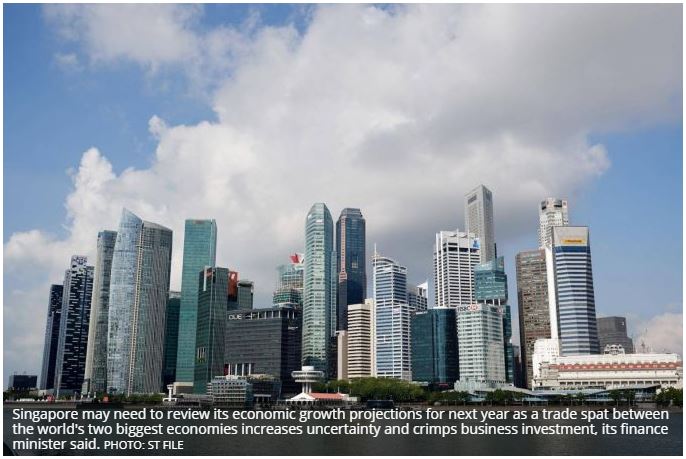Singapore assessing 2019 forecasts as trade war risks loom: Heng Swee Keat
[SINGAPORE] Singapore may need to review its economic growth projections for next year as a trade spat between the world’s two biggest economies increases uncertainty and crimps business investment, its finance minister said.
“In the short run, the impact is not fully felt yet,” with Singapore retaining its growth forecast for this year at 2.5 per cent to 3.5 per cent, Heng Swee Keat said in an interview on Friday with Bloomberg Television’s Haslinda Amin. “But any trade tension that sets back globalisation will affect everyone, including the countries that are directly involved, but also collateral damage right across all economies.”
Mr Heng made the comments ahead of this week’s Bloomberg New Economy Forum in Singapore, where policy makers and business executives will gather to discuss the changing dynamics in the world as economic influence shifts from the West to the East.
In Southeast Asia, nations are grappling with a potent storm of economic challenges: a high-stakes tariff battle between the US and China, global monetary policy tightening, a strengthening dollar and the risk of capital outflows.
Singapore, an international trading hub that benefits from trade flows and the movement of goods between the region’s manufacturing centers, the US and Europe, has already seen exports ease this year.
UNCERTAIN OUTLOOK
Asked if Singapore might have to reassess its yet-to-be announced projections for 2019, Mr Heng said, “Indeed,” pointing to the International Monetary Fund’s downgrade of its global forecast. Economic agencies and the central bank have been in close touch with businesses and are looking at whether the projections need to be “changed or revised,” he said.
“We are beginning to see the effects of this in terms of this increased uncertainty, and reduced investment by businesses,” he said. While 2018 growth is likely to come in at the upper half of the projection, “as to next year, it depends on how the situation continues to develop in the next few months because many of these investment decisions that ought to be taken will be affected.”
Beyond 2019, a prolonged trade war would severely disrupt the global supply chain, throwing up long-term growth challenges for countries as the “global production frontier” is diminished, Mr Heng said.
TRADE RISKS
The 57-year-old minister is one of several men considered to be a leading candidate to be Singapore’s next prime minister. He has held the post of finance minister since 2015, and previously served as education minister and managing director of the Monetary Authority of Singapore.
Mr Heng said, “Asia’s structural drivers from growth are strong. Look at the population, the rising middle class, the embrace of multi-lateralisation and free trade, and also increasingly the efforts in technology and innovation.”
“What we hope to do is to position Singapore as a global Asian node of technology, innovation and enterprise,” with Singapore deriving a competitive edge from its connectivity to the global economy and Asia, its adherence to international standards and rule of law, and its openness. “Our protection of intellectual property and the trust that people have in Singapore as a business centre is so important.”
SUPPLY CHAINS
“This trade dispute is causing concern among businesses, and they are all looking at how they can build resilience into their supply chain. In the short run, there will be some of those immediate changes” and “the natural evolution of the supply chain is now facing a severe shock because of this change.”
“Will it be a plus for the global economy in the long run? Not if the trade conflict remains prolonged, because what it does mean is you’re moving away from what ought to be the production frontier for the global economy,” and specialisation that “ought to take place and ought to evolve as economic conditions change may be diverted in some ways.”
“The countries in the region will have to make the best out of this untidy situation” by accelerating their development of infrastructure, connectivity and other areas. “Otherwise the supply chain becomes very inefficient, and every one of us is going to pay for it,” he added.
TRADE BLOCS
The world breaking into regional trade blocs “can be harmful but if we can use a bilateral agreement, regional agreements as building blocks towards global agreements, and to build trust and confidence in the system and to give time for economies to make structural adjustments, then I think we must continue and that can pave the way for multilateral agreements,” he said.
“I think it will serve all countries best if we have agreement at the level of the WTO. The WTO remains a very important institution for us to defend, for us to upkeep, because I think a rules-based global multilateral system” serves the interests of countries better.
SINGAPORE BUDGET
“Our priority areas remain for economic restructuring,” with innovation being a key part of policy makers’ work. “The other big area is looking at infrastructure development” with urbanisation being a major trend in Asia.
TAX STRUCTURE
“I had many, many discussions already with my staff on the outline of what we are going to announce, but not just for this year but for a number of years, on the changes that we need to make across in our spending pattern, in our revenue pattern. We believe that we should not be planning on the basis of just year to year, but we need to take a longer-term view of some of our needs.”
Taxing labour less and capital more “is one of the options that we are looking at” but “we have a range of possible instruments.” Consumption tax will still be a major part of the tax base over the next five-year horizon, he said.
BLOOMBERG
Source: https://www.businesstimes.com.sg/government-economy/singapore-assessing-2019-forecasts-as-trade-war-risks-loom-heng-swee-keat


 English
English




